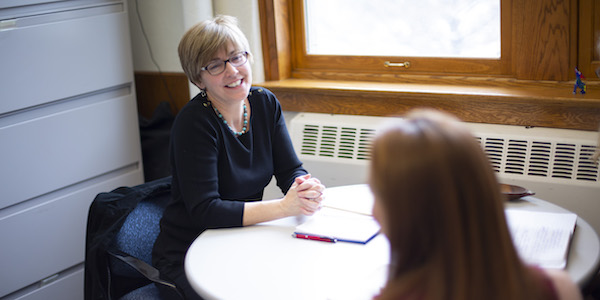
Self-Reflection to Social Change
A high school student exchange trip to Brazil changed the direction of Carmen Bain’s life.
“I was in a very impoverished area in Brazil for one year when I was 16 years old. When I came home I wanted to do something about it,” says Bain, a sociology professor.
Bain, who grew up in New Zealand, said she returned home with a drive to change the inequities she’d seen in Brazil. In college she changed her major four times and finally found sociology as a way to work toward social change. She shares that story with students to help them understand the need to search for the right major.
Her influence helped Emily Hugen, a senior in agronomy, choose the agriculture and society major as part of her double major. Hugen says Bain introduced her to sociology.
“She really opened my eyes to learn how to evaluate social constructs that could be a factor in the development of individuals.,” Hugen says. “Overall, Dr. Bain’s influence has made me more mindful in how I interact with others and society in general.”
Bain says she wasn’t interested in agriculture when she first entered college, but her first research project at the University of Canterbury focused on meat safety and the challenges farmers faced.
“Sociologists are interested in questions of power and inequality. I would never have thought I would address those questions working with meat safety standards,” Bain says.
Bain earned her bachelor’s and master’s degree from the University of Canterbury in New Zealand. She earned her doctorate at Michigan State University where she focused on global ag policy and how it affects developing countries.
Bain joined Iowa State University in 2013, and today she’s challenging students to address social problems.
The key, she says, is helping students understand themselves.
“Everyone has a set of values or beliefs about agriculture and food,” Bain says. “If we can understand what’s shaped our attitudes and behaviors we can do a better job of addressing the grand challenges.”
To help students understand their viewpoints, Bain has them write self-reflective papers on how their experiences shaped their attitudes and behaviors.
“It’s to help them reflect on themselves, but also to help them understand others,” Bain says.
Bain’s New Zealand accent tips off her students that she isn’t from the United States, although she is a U.S. citizen. She shares her background with students, so they have a better understanding about how she developed her view of the world.
Bain has expanded her food safety research to attitudes about GMO labeling and gene-edited foods. Leana Bouffard, professor and chair of sociology, says Bain just received a $495,000, three-year USDA National Institute of Food and Agriculture grant to analyze the attitudes and policy surrounding gene-edited foods.
“Her work looks at how people understand gene-edited foods, government regulation, industry messages and how people decide if they’ll consume those foods or not,” Bouffard says.
It’s that cutting-edge research that attracts students to Bain’s classes. And, according to Bouffard, Bain helps students personally connect with data and concepts presented in the class.
“When students connect to the v make a difference. She has the ability to make that happen,” Bouffard says.
One of her former students, Lakeisha Perkins (’18 agriculture and society), says Bain helped expand her potential. Perkins received the Bill Emerson National Hunger Fellowship and is working in Washington D.C. with the Food, Research and Action Center, a non-profit organization working to eradicate poverty-related hunger and undernutrition in the U.S.
“Dr. Bain is one of the reasons I was confident enough to take my passion for ending poverty and hunger in this country, fueled by my own experiences with it, and turn it into a career,” Perkins says. “Without her support and encouragement, I would not be where I am today.”
Analyzing issues of inequality led Bain to develop one of the first classes nationwide to examine the history and changing roles of women in agriculture within the United States. The course critically examines women’s identities, roles and gender relations in agriculture and food systems. Bain says women have always played an invisible role on the farm.
“They’ve often been categorized as simply doing the books or as farm wives. Their role has not been viewed as critically important to sustaining the farm household,” Bain says.
Along with research and teaching, she advises students majoring in agriculture and society. In all these roles she hopes to help students better understand how they developed their attitudes and views.
“Sociologists believe if we understand where people come from – we can do a better job of solving the problems they face,” Bain says.



